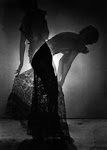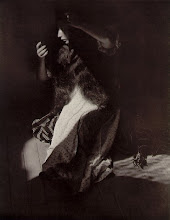Dreams in Celluloid, Part IV
70. JURAJ HERZ
Hypnotic camera work, a charming though ultimately disquieting protagonist and a particularly sinister undertone. Herz didn't make all that many films, but The Cremator ranks as one of the greatest of all time. Herz manages to capture the claustrophobic, uneasy atmosphere of a Czech nation about to be taken over by Hitler and he does so with a wicked sense of dark humour. The Cremator is a man obsessed with death it is constantly haunting him. Surrealist horror with a strong message. Great transitions between scenes too.
69. COEN BROTHERS
Over the years the Coen Brothers seem to swing a lot from the amazing kind to the ‘what were you thinking’ kind of films. Take No Country For Old Men and the recent Burn After Reading and there’s definitely something lacking in the latter. But still, when they hit the mark, they hit the mark and few other American directors can touch them. And Fargo is a pretty damn special kind of film that only the Coen Brothers are capable of with their dark sense of humour and sense of drama.
68. WONG KAR-WAI
If there’s one thing I love above all else in film, it’s the ability it has to completely overwhelm you with a series of beautiful images. And Wong Kar-wai certainly knows how to enrapture his audience with his highly stylised, strikingly shot films. Coupled with that Chungking Express is one of my favourite modern love stories – a little bit quirky sure, but is full of unusual moments and interesting insights into one of the most hectic cities in the world.
67. JIM JARMUSCH
If anyone can make a film about death, fill it full of subtle symbolism and metaphor, throw in a bit of existential musing and write a narrative in the form of a western then Jarmusch is the man. Of course Jonny Depp is great as the deadpan accountant on the run following a little bit of murder, but that’s not really what the film’s about – as always with Jarmusch, his effort to understand how different people see the world gives the film a strong intellectual backbone and philosophical tension. Maybe he’s become a little bit too hip in recent years – I mean Coffee & Cigarettes features just about everyone who’s considered cool from Tom Waits & Iggy Pop to Steve Buscemi & Bill Murray. Then again, that film is pretty damn funny.
66. BERNARDO BERTOLUCCI
Bertolucci is maybe best known for his provocative Last Tango In Paris, but it’s The Conformist which seems to excite all the critics and I guess they’ve got a point. It’s based on Alberto Moravia’s novel of the same name – the writer incidentally also inspired Godard to turn his novel, Contempt into the directors most popular film – except Bertolucci demonstrating his control over his medium, re-arranges the narrative and fills his film with an almost labyrinthine series of flashbacks. A powerful examination of political unrest and psychological disturbance.
65. EMIR KUSTURICA
One thing that really hits you when you’re watching a Kusturica film is the sense of fun. There’s usually a Yugoslavian gypsy band trawling through each scene, dancing and drinking, bizarre relationship ménage a trois’s, bawdy humour etc. etc. Underground was my first experience of Kusturica’s colourful world and I couldn’t help but admire his artistic vision and sense of grandeur. Certainly it’s epic, with a little bit of a Godfather trait as the generations pass and one character usurps another, but this is entirely Kusturica’s world and anything is possible.
64. LOUIS FEUILLADE
Feuillade was a prolific filmmaker – he made something like 800 (though the numbers differ depending on where you look) films over the course of 20 or so years. So you’d think that due to the sheer quantity there’d be little room for quality and the final results might have something of an Ed Wood ‘so bad they’re good’ kind of feeling. Feuillade certainly had a certain ridiculousness to his filmmaking – impeded by the war his series Les Vampires has an almost illogical progression as actors were drafted into the army and locations were limited. But Feuillade obviously had a very definite knack for turning out both bizarre yet intriguing films. Along with Fantomas, Les Vampires is one of the most entertaining early criminal mastermind series out there.
63. LUCHINO VISCONTI
The Italian Count who decided to make some films. Mostly epic like The Leopard – two of my favourite shots in cinema (the house) and the shot of the family’s faces in church – but before all that, he made Le Notti Bianche with stylish Marcello Mastroianni playing a decidedly less cool character. Full of emptiness, Visconti successfully twists the Dostoyevsky short story on which the film is based into something as equally psychologically engaging. It’s a film about obsession and lust as the despondent Mario meets an upset Natalia (Maria Schnell) one evening. As always with Visconti, there is a real sense of poetry as the two characters begin to talk to one another, but as always with Visconti, there is an underlying fragility beneath it all, which wins the day.
62. GEORGES FRANJU
Franju is probably most famous for Les Yeux sans visage – a film about an obsessed doctor attempting to discover a method of facial transplantation, told with fairy-talesque horror, sinister carnival music and expressionistic filmmaking techniques. But one step further into psychological (psychosexual call it what you will) meltdown is Judex – a film full of symbolic references, haunting characters and poetic metaphor. Franju’s film is a tribute to, but also a re-invention of silent French cinema, especially Feuillard’s 1916 film of the same name and has something of the magical quality of Cocteau’s best work.
61. MANOEL DE OLIVEIRA
A beautiful film. Oliveira surely deserves wider recognition in the film world. Abraham’s Valley is similar in feeling to Rivette’s early 90s films - that same kind of delicate, nuanced approach to filmmaking, and since Oliveira’s film is based on Flaubert’s famous Madame Bovary, the naturalistic method is well suited in capturing the power of the book.













0 comments:
Post a Comment